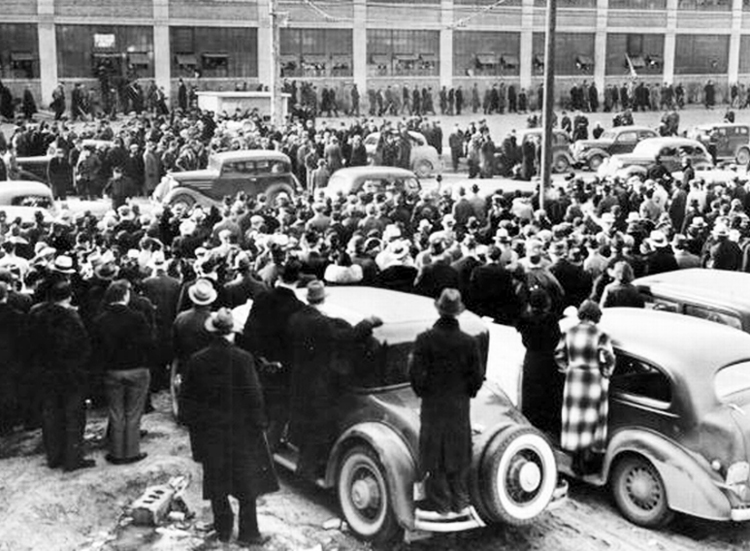This excerpt is from The Struggle for a Proletarian Party by James P. Cannon, one of Pathfinder’s Books of the Month for September. A companion volume to In Defense of Marxism by Leon Trotsky, it records the fight in the Socialist Workers Party to build a party deeply rooted in the working class as the U.S. rulers were moving to enter World War II. At issue was a party that can lead working people to take power and replace capitalist rule. Both were written as part of the political battle against a petty-bourgeois opposition in the Socialist Workers Party that recoiled from the party’s proletarian course under the patriotic pressure. Cannon was a founder of the communist movement in the U.S. and national secretary of the SWP. Copyright © 1972 by Pathfinder Press. Reprinted by permission.
BY JAMES P. CANNON
Political struggles in general, including serious factional struggles in a party, do not take place in a vacuum. They are carried on under the pressure of social forces and reflect the class struggle to one degree or another. This law is demonstrated in the most striking manner in the development of the present discussion within our party.
At the present time the pressure of alien class forces upon the proletarian vanguard is exceptionally heavy. We must understand this first of all. Only then can we approach an understanding of the present crisis in the party. It is the most severe and profound crisis our movement has ever known on an international scale. The unprecedented tension in the ranks signalizes a conflict of principled positions which is obviously irreconcilable. Two camps in the party fight for different programs, different methods, and different traditions. …
For those who understand politics as an expression of the class struggle — and that is the way we Marxists understand it — the basic cause of the crisis in the party is not hard to find. The crisis signifies the reaction in our ranks to external social pressure. That is the way we have defined it from the outset of the crisis last September, immediately following the signing of the Soviet-Nazi pact and the beginning of the German invasion of Poland. More precisely, we say the crisis is the result of the pressure of bourgeois-democratic public opinion upon a section of the party leadership. That is our class analysis of the unrestrained struggle between the proletarian and the petty-bourgeois tendencies in our party. …
[The minority] is concerned first of all with “democratic guarantees” against degeneration of the party after the revolution. We are concerned first of all with building a party that will be capable of leading the revolution. [Their] conception of party democracy is that of a perpetual talking shop in which discussions go on forever and nothing is ever firmly decided. …
Our conception of the party is radically different. For us the party must be a combat organization which leads a determined struggle for power. The Bolshevik party which leads the struggle for power needs not only internal democracy. It also requires an imperious centralism and an iron discipline in action. It requires a proletarian composition conforming to its proletarian program. The Bolshevik party cannot be led by dilettantes whose real interests and real lives are in another and alien world. It requires an active professional leadership, composed of individuals democratically selected and democratically controlled, who devote their entire lives to the party, and who find in the party and in its multiform activities in a proletarian environment, complete personal satisfaction.
For the proletarian revolutionist the party is the concentrated expression of his life purpose, and he is bound to it for life and death. He preaches and practices party patriotism, because he knows that his socialist ideal cannot be realized without the party. In his eyes the crime of crimes is disloyalty or irresponsibility toward the party. The proletarian revolutionist is proud of his party. He defends it before the world on all occasions. The proletarian revolutionist is a disciplined man, since the party cannot exist as a combat organization without discipline. When he finds himself in the minority, he loyally submits to the decision of the party and carries out its decisions, while he awaits new events to verify the disputes or new opportunities to discuss them again. …
Our movement, the movement of scientific socialism, judges things and people from a class point of view. Our aim is the organization of a vanguard party to lead the proletarian struggle for power and the reconstitution of society on socialist foundations. That is our “science.” We judge all people coming to us from another class by the extent of their real identification with our class, and the contributions they can make which aid the proletariat in its struggle against the capitalist class. That is the framework within which we objectively consider the problem of the intellectuals in the movement. …
In the Communist Manifesto, in which the theory and program of scientific socialism was first formally promulgated, it was already pointed out that the disintegration of the ruling capitalist class precipitates sections of that class into the proletariat; and that others — a smaller section to be sure, and mainly individuals — cut themselves adrift from the decaying capitalist class and supply the proletariat with fresh elements of enlightenment and progress. Marx and Engels themselves, the founders of the movement of scientific socialism, came to the proletariat from another class. The same thing is true of all the other great teachers of our movement, without exception.
Lenin, Trotsky, Plekhanov, Luxemburg — none of them were proletarians in their social origin, but they came over to the proletariat and became the greatest of proletarian leaders. In order to do that, however, they had to desert their own class and join “the revolutionary class, the class that holds the future in its hands.” They made this transfer of class allegiance unconditionally and without any reservations. Only so could they become genuine representatives of their adopted class, and merge themselves completely with it, and eliminate every shadow of conflict between them and revolutionists of proletarian origin. There was and could be no “problem” in their case.


